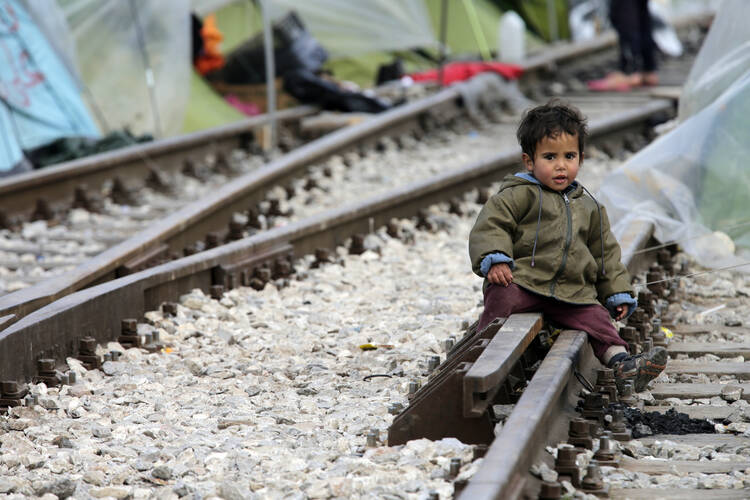Emphasizing the dramatic plight of child migrants in countries across the world, Pope Francis on Oct. 13 appealed to “everyone”—states, institutions and religious communities—to work for “the protection and integration of child migrants.” He also emphasized the pressing need for long-term solutions that tackle the root causes of this phenomenon.
In his message for the World Day of the Migrant and Refugee that will be celebrated throughout the Catholic world on Jan. 15, 2017, Francis highlighted the urgent need to respond in a positive way to the distressing and dramatic situation of vast numbers of “child migrants, especially the ones who are alone.” He gave no figure for these children, but sources in the field say there are “millions” of them among the more than 65 million refugees, displaced persons and migrants in today’s world. The United Nations reports that more than 50 percent of the world’s 21.3 million refugees are children.
“I ask everyone to take care of the young, who in a threefold way are defenseless: they are children, they are foreigners and they have no means to protect themselves,” Pope Francis said. He reminded Christians that “faith in God” is expressed in “loving proximity to the smallest and the weakest” through the spiritual and corporal works of mercy. The Vatican released the statement in several languages, including English, on Oct. 13.
Pope Francis has repeatedly called for a truly humane response to the dramatic phenomenon of migration that “affects all continents and is growing into a tragic situation of global proportions.” He highlighted the fact that “children are the first among those to pay the heavy toll of emigration, almost always caused by violence, poverty, environmental conditions, as well as the negative aspects of globalization.”
They suffer, he said, because they lack stable family life and education and are exploited by “unscrupulous people” seeking to make “quick and easy profit” through child trafficking and the exploitation and abuse of minors. Some lead them into prostitution or the mire of pornography, enslave them as child laborers or soldiers or involve them in drug trafficking and other forms of criminality.
Pope Francis highlighted the undeniable and painful fact that “among migrants, children constitute the most vulnerable group because as they face the life ahead of them, they are invisible and voiceless: their precarious situation deprives them of documentation, hiding them from the world’s eyes; the absence of adults to accompany them prevents their voices from being raised and heard.”
How should we respond to this reality? Pope Francis suggested three ways ahead.
First, he said, Christians should recognize the phenomenon of migration as “a sign of the times” that speaks of “the providential work of God in history and in the human community, with a view to universal communion.”
The church encourages us “to recognize God’s plan,” to understand that “no one is a stranger in the Christian community” and to remember that “each person is precious.”
“Persons are more important than things,” the pope said, “and the worth of an institution is measured by the way it treats the life and dignity of human beings, particularly when they are vulnerable, as in the case of child migrants.”
He underlined the need to work toward protection, social integration and long-term solutions. Francis called for the adoption of “every possible measure to guarantee the protection and safety of child migrants” who “often end up on the street abandoned to themselves and prey to unscrupulous exploiters.” He demanded “more rigorous and effective action” against those who profit from such criminal acts.
Francis drew attention to the “many factors” that contribute to making migrants vulnerable, especially if they are children: “poverty and the lack of means to survive—to which are added unrealistic expectations generated by the media; the low level of literacy; ignorance of the law, of the culture and frequently of the language of host countries.”
He said it is necessary for migrants “to cooperate ever more closely with the communities that welcome them, for the good of their own children,” and he thanked those organizations and institutions, both ecclesial and civil, that commit time and resources to protect minors from various forms of abuse.
Turning to his second suggestion, Francis said it is imperative “to work for the integration of children and youngsters who are migrants.” He noted that when nations face scarcity, programs aimed at the assistance and inclusion of migrants are often cut, replaced by efforts to curb the entrance of migrants. That in turn fosters illegal networks or in the repatriation of migrants without any concern for their best interests.
He highlighted the fact that the condition of child migrants is worsened when their legal status is not regularized or when they are recruited by criminal organizations and then sent to detention centers, often for long periods.
Some nations today focus on stopping the flow of migrants into their country, also by building barriers, but Pope Francis insisted that “the right of states to control migratory movement and to protect the common good of the nation must be seen in conjunction with the duty to resolve and regularize the situation of child migrants, fully respecting their dignity and seeking to meet their needs when they are alone, but also the needs of their parents, for the good of the entire family.”
Francis appealed for “long-term solutions” to the phenomenon of migration and child migrants, arguing that the root causes that produce migration, including wars, human rights violations, corruption, poverty, environmental imbalance and disasters, need to be addressed. “It is absolutely necessary that the international community deal with the causes that trigger migrations in the countries of origin by working to eliminate the conflicts and violence that force people to flee,” he said.








